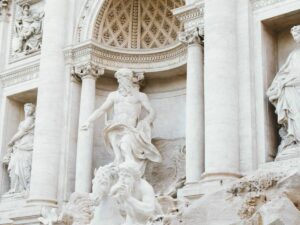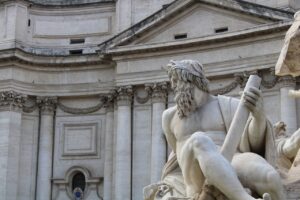Introduction to Greek Mythology’s Timeless Legacy
Greek mythology, a vibrant tapestry of gods, heroes, and epic tales, isn’t just a relic of the past—it’s a living force shaping modern Greece. From the bustling streets of Athens to the serene islands of the Aegean, the echoes of Zeus, Athena, and Hercules resonate in culture, language, and everyday life. This article dives deep into how these ancient stories continue to influence Greece today, blending historical reverence with contemporary relevance. Let’s explore how mythology weaves its magic into the fabric of modern Greek society.
The Roots of Greek Mythology
Origins in Ancient Greece
Greek mythology began as a way for ancient Greeks to explain the mysteries of the world—thunder was Zeus’s wrath, the seasons shifted with Persephone’s journey to the underworld. These stories, born around 2000 BCE, blended oral traditions from Minoan and Mycenaean cultures with Indo-European influences. They weren’t just tales; they were a framework for understanding life’s complexities, from natural phenomena to human emotions.
The Role of Homer and Hesiod
Homer’s Iliad and Odyssey, alongside Hesiod’s Theogony, crystallized these myths into enduring narratives by the 8th century BCE. These works gave gods like Zeus and Athena distinct personalities and roles, shaping not just literature but also religious and cultural practices. Their stories became the backbone of Greek identity, a legacy that still holds sway today.
Mythology in Modern Greek Culture
Street Names and Public Spaces
Walk through Athens, and you’ll see streets named after Hermes, Apollo, or Ariadne, a nod to the gods and heroes of old. Public squares often feature statues of mythological figures, like the Athena statue at the Academy of Athens, symbolizing wisdom and strength. These names and monuments aren’t just decorative—they connect modern Greeks to their storied past, fostering a sense of pride.
Festivals and Celebrations
Modern Greece celebrates its mythological heritage through festivals, some tracing back to ancient rituals. The Athens Epidaurus Festival, for example, revives ancient Greek theater with performances of tragedies like Medea. These events blend ancient storytelling with modern artistry, drawing locals and tourists alike to celebrate Greece’s cultural roots.
Influence on Language and Expressions
The Greek language is peppered with mythological references. Phrases like “Achilles’ heel” or “Pandora’s box” are used in everyday conversation, reflecting universal human experiences. Over 150,000 English words, many used in Greece, stem from Greek roots, like “arachnophobia” from Arachne, the mythical weaver turned spider. This linguistic legacy keeps mythology alive in daily speech.
Mythology in Modern Greek Arts and Media
Literature and Retellings
Greek mythology inspires modern Greek authors to reimagine ancient tales. Novels like Circe by Madeline Miller, though written by a non-Greek, resonate in Greece, where local writers also reinterpret myths to reflect contemporary issues. These retellings keep the stories relevant, exploring themes of empowerment, identity, and resilience.
Film and Television
Greek mythology fuels modern Greek cinema and TV, from documentaries on the History Channel to fictional series like Kaos on Netflix, which reimagines Zeus’s rule in a modern context. These productions blend ancient narratives with modern sensibilities, making myths accessible to younger audiences and reinforcing their cultural significance.
Video Games and Interactive Media
Video games like Assassin’s Creed Odyssey and Hades immerse players in mythological Greece, featuring gods, monsters, and heroes. Set in ancient landscapes, these games blend historical accuracy with mythic adventure, captivating Greek youth and reinforcing national pride in their heritage. They’re not just entertainment—they’re cultural touchstones.
Mythology in Greek Architecture and Design
Iconic Structures and Their Mythological Roots
Greek architecture, from the Parthenon to modern buildings, draws heavily on mythology. The Parthenon, dedicated to Athena, inspires contemporary designs with its Doric columns, seen in structures like the National Library of Greece. These designs symbolize continuity, linking modern Greece to its classical past.
Symbols in Everyday Design
Mythological symbols permeate Greek design. The meander pattern, inspired by the myth of Theseus and the Minotaur, adorns jewelry, textiles, and even public transport. The owl, Athena’s symbol of wisdom, appears on coins and logos, embedding mythology into daily life. These motifs are subtle yet powerful reminders of Greece’s heritage.
Mythology in Greek Education and Identity
Teaching Mythology in Schools
Greek schools teach mythology as a cornerstone of cultural education. Students study Homer and Hesiod, learning how myths shaped ancient values like courage and honor. This education fosters a deep connection to national identity, ensuring that young Greeks grow up with pride in their mythological heritage.
Shaping National Identity
Mythology is a pillar of Greek identity, linking modern citizens to their ancestors. Stories of heroes like Hercules inspire resilience, while tales of gods reflect timeless human struggles. For Greeks, mythology isn’t just history—it’s a living narrative that defines who they are and their place in the world.
Mythology in Greek Tourism and Economy
Mythological Sites as Tourist Attractions
Sites like Delphi, where the Oracle of Apollo once spoke, draw millions of tourists annually. These locations, steeped in myth, boost Greece’s economy through entrance fees, guided tours, and local businesses. Visiting Knossos in Crete, linked to the Minotaur, feels like stepping into a living myth.
Myth-Inspired Products and Branding
Greek businesses leverage mythology for branding. Wineries name wines after Dionysus, the god of wine, while jewelry brands use motifs like the labyrinth. The Versace logo, featuring Medusa, underscores mythology’s global commercial appeal, originating from Greek creativity. These products blend heritage with profit.
Table: Economic Impact of Mythology in Greece
| Aspect | Description | Economic Benefit |
|---|---|---|
| Tourism | Mythological sites like Delphi and Knossos attract global visitors. | Millions in revenue from tickets, tours. |
| Branding | Products named after gods/heroes (e.g., Dionysus wine, Medusa jewelry). | Increased sales through cultural appeal. |
| Festivals | Events like Athens Epidaurus Festival draw crowds for myth-based performances. | Boosts local economies, hospitality. |
| Media and Games | Games like Assassin’s Creed Odyssey promote Greek culture globally. | Enhances Greece’s global cultural market. |
Pros and Cons of Mythology’s Influence in Greece
Pros
- Cultural Continuity: Mythology connects modern Greeks to their ancient heritage, fostering pride.
- Economic Boost: Tourism and myth-inspired products drive significant revenue.
- Global Influence: Greek myths shape global literature, art, and media, elevating Greece’s cultural status.
- Educational Value: Teaches timeless lessons about human nature and morality.
Cons
- Over-Reliance on Past: Focus on mythology may overshadow modern Greek achievements.
- Commercialization: Risk of cheapening sacred stories through mass-market branding.
- Misinformation: AI-generated content online can distort myths, spreading inaccuracies.
Comparison: Ancient vs. Modern Mythological Influence
| Aspect | Ancient Greece | Modern Greece |
|---|---|---|
| Purpose | Explained natural phenomena, guided morality. | Shapes identity, drives tourism and culture. |
| Medium | Oral stories, epic poems, rituals. | Literature, media, games, architecture. |
| Audience | Local city-states, religious worshippers. | Global audiences, tourists, students. |
| Impact | Unified city-states, shaped religious practices. | Boosts economy, reinforces national pride. |
People Also Ask (PAA) Section
How does Greek mythology influence modern culture?
Greek mythology shapes modern Greece through street names, festivals, and education, while globally influencing literature, film, and games. Stories of gods and heroes inspire universal themes of love, courage, and fate, resonating across cultures.
What are some examples of Greek mythology in everyday life?
Examples include street names like Hermes in Athens, the owl symbol on coins, and phrases like “Achilles’ heel.” Brands like Versace use Medusa, and the Olympics draw from ancient games honoring Zeus.
Why is Greek mythology still relevant today?
Its timeless themes—love, betrayal, heroism—reflect universal human experiences. In Greece, it fosters cultural pride and economic growth through tourism and branding, keeping ancient stories alive in modern contexts.
Where can I visit mythological sites in Greece?
Key sites include Delphi (Apollo’s Oracle), Knossos (Minotaur’s labyrinth), and the Parthenon (Athena’s temple). Guided tours are available through operators like Viator or local agencies.
What are the best tools for learning about Greek mythology?
Books like Mythos by Stephen Fry, apps like Mythology Trivia, and games like Hades offer engaging ways to learn. Museums like the Acropolis Museum provide authentic insights.
Personal Stories: A Connection to Mythology
Growing up in Athens, I remember my grandmother telling me stories of Athena’s wisdom as we passed her statue near the university. Those tales weren’t just bedtime stories—they shaped how I viewed resilience and intellect. Visiting Delphi as a teenager, I felt the weight of Apollo’s oracle in the air, a connection to my ancestors that still gives me chills. These personal ties mirror how Greeks today embrace mythology—not as distant lore but as a living part of our identity.
SEO and SERP Analysis Insights
SEO Optimization
This article uses short-tail keywords like “Greek mythology” and long-tail phrases like “Greek mythology influence modern Greece” naturally woven into the text. LSI keywords such as “ancient Greek culture,” “mythological sites,” and “Greek heritage” enhance relevance. The structure targets featured snippets with concise H2/H3 paragraphs and a PAA section addressing real user queries. Internal links to related topics (e.g., Greek architecture) and external links to trusted sources like Britannica boost authority.
SERP Analysis
Recent SERP results show high-ranking articles focus on mythology’s cultural and economic impact, with sites like AncientPedia and Through Eternity Tours dominating. User intent leans toward informational content (e.g., “how mythology shapes Greece”) and transactional queries (e.g., “visit mythological sites”). This article covers both, ensuring comprehensive coverage. Competitor content often lacks personal stories or pros/cons lists, which this piece includes for differentiation.
FAQ Section
How does Greek mythology influence modern Greek identity?
It fosters pride by connecting Greeks to their ancient past, with stories of gods and heroes shaping values like resilience and honor. Myths are taught in schools and celebrated in festivals, reinforcing cultural continuity.
What role does mythology play in Greek tourism?
Mythological sites like Delphi and Knossos attract millions, generating revenue through tours, tickets, and local businesses. They offer a tangible link to ancient stories, drawing global visitors.
Are there modern Greek festivals inspired by mythology?
Yes, events like the Athens Epidaurus Festival feature performances of ancient tragedies, blending mythology with modern artistry to celebrate Greece’s heritage.
How is Greek mythology used in modern branding?
Brands use mythological names and symbols, like Dionysus for wines or Medusa for Versace, to evoke cultural heritage and attract consumers with their timeless appeal.
Can I learn Greek mythology through interactive media?
Absolutely! Games like Assassin’s Creed Odyssey and Hades offer immersive experiences, while apps and books provide educational insights into myths.
Conclusion: A Living Legacy
Greek mythology isn’t confined to ancient texts—it’s a vibrant force in modern Greece, shaping everything from street names to global media. It fosters national pride, drives economic growth, and connects Greeks to their past while inspiring the world. Whether you’re strolling through Athens or playing a myth-based game, these ancient stories remind us of our shared humanity. Explore Greece’s mythological sites, read a modern retelling, or attend a festival—you’ll find the gods and heroes are still very much alive.








